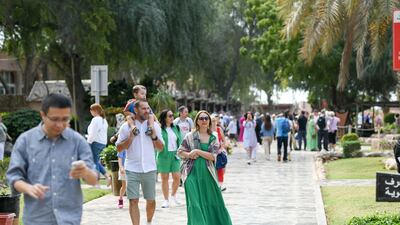Earlier this year, President Sheikh Mohamed said in Abu Dhabi that families are the foremost source of education and the cornerstone of a robust and stable society. Family support, Sheikh Mohamed said, would be a primary focus of government.
This is in keeping with the traditions of the country. The UAE's Founding Father, the late Sheikh Zayed bin Sultan Al Nahyan, once said: “Families are the foundation of a developed community.”
Governments have a role to play in shaping the well-being of communities and nations. In examining the intricate web of governance and public policy, one cannot help but notice that a healthy social sector results in a closer-knit community. Investment in this sector is important as it culminates in a stronger society.
But what exactly is the social sector? It is a collective that works cohesively for social and humanitarian needs, with a focus on community development, including familycare services. Thus, the Family Care Authority (FCA) is a social sector entity under the Department of Community Development in Abu Dhabi, which was established in 2021.
When families have access to familycare services, children perform better in school, health outcomes improve and economic prospects grow.
Rooted in Abu Dhabi's commitment to social well-being, FCA is mandated to advance the quality of life for families in the emirate. It is the point of contact for people and families seeking support – whether counselling, emergency aid, parenting workshops or mental health support. The organisation extends its embrace to families, including the elderly, people with disabilities, the youth, vulnerable groups and those in conflict with the law. Ultimately, we aim to create a comprehensive one-stop shop of family services.
FCA's dedication to fostering well-rounded family development is evident through its various programmes. The organisation has processed a total of 7,854 case files for 17,634 beneficiaries from January to December 2023. Among them, 238 people have received immediate assistance through FCA's social emergency support services, showcasing the organisation's responsiveness to critical situations.
The counselling services provided by FCA have had a substantial impact since being launched in October, with 692 people benefiting from advanced social counselling, 596 seeking assistance through psychological guidance, and 378 through legal guidance. This adds up to more than 1,500 people served through FCA's counselling services, addressing a spectrum of needs and contributing to the overall well-being of residents.
In addition to this, 65 FCA caregivers actively participated in the Caregiver Capability Building and Training Programmes. This initiative enhances the skills and knowledge of caregivers, ensuring better care for families in need. The positive outcomes of these training programmes extend beyond caregivers, reflecting on the well-being of the families they support.
Another important aspect is FCA's temporary sheltering service that has benefitted 61 people who have been provided a safe haven when facing immediate housing challenges.
The impact of FCA's helpline is evident in the handling of at least 540 calls up until the first two months of the year. The call centre plays a vital role in connecting people with the support they need, serving as a crucial resource for residents seeking assistance. It is a key avenue for residents to access information, emergency aid and counselling services, contributing to the accessibility and effectiveness of FCA's support network.
Further, 282 FCA case managers, counsellers, caregivers, and call centre agents underwent a total of 10,110 training hours. This investment in continuous learning ensures that FCA's team remains well-equipped to address the evolving needs of Abu Dhabi's residents, enhancing the quality of services provided. The tangible outcomes of FCA's initiatives highlight its contribution to improving the lives of residents in Abu Dhabi.
Parenting programmes, skill development ones and mental health support initiatives exemplify FCA's dedication to fostering well-rounded family development. These programmes have translated into parents acquiring new skills such as effective communication, emotional intelligence, setting boundaries and positive reinforcement, which lead to young people growing up with confidence and transforming their lives.
FCA’s strategic alliance with government entities, private and third-sector organisations and community leaders reinforces the comprehensive support system that it provides. The Emirati family structure, transitioning from traditional multi-generational homes to modern nuclear setups, underscores this transformation. To effectively address these changes and other emerging societal challenges, the organisation has multiple services to cater to the evolving dynamics of families in Abu Dhabi.
The authority's proactive stance goes beyond addressing existing needs; it anticipates and adapts to evolving requirements of families. By continuing to engage in partnerships with stakeholders ranging from government bodies to the private sector to NGOs, FCA keeps a finger on the community's pulse.
As the director general of FCA, I am committed to supporting Abu Dhabi’s vision to enhance the city's quality of life indicators and it is my privilege to do so. I encourage global private entities to come forth and collaborate with mandated government entities to empower families through FCA’s comprehensive support framework. The bedrock of prosperity, after all, lies in nurturing people. Prosperous communities are not merely a product of financial wealth, but a reflection of education, stability and the overall well-being of residents.
Because when investment is made in the social sector, the returns at a societal level are groundbreaking. This, in turn, leads to a more prosperous community, with a stronger economy, more innovation, and, in general, a more empowered society. A transformation such as this starts at the grassroots level, within the very neighbourhoods and families that make a diverse society.


